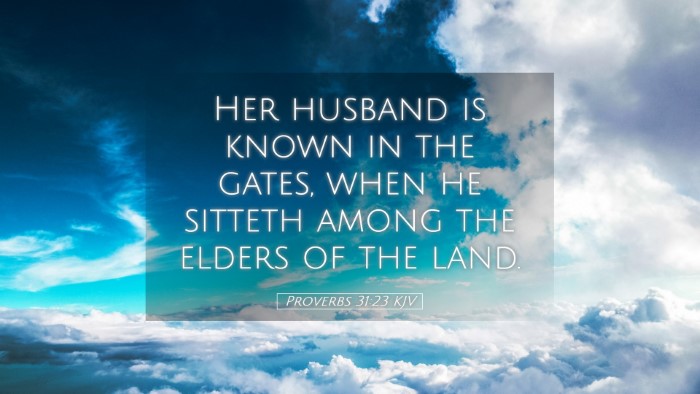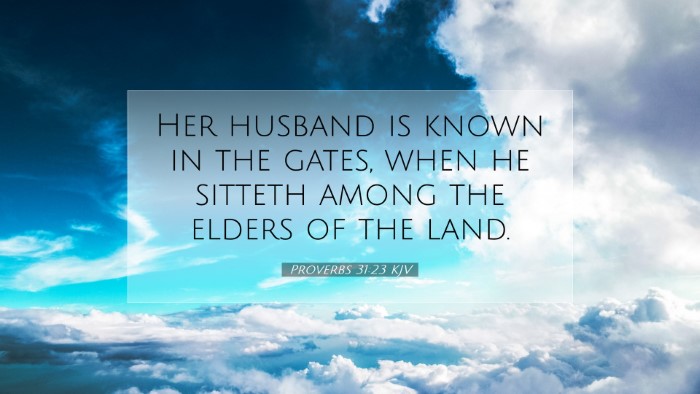Commentary on Proverbs 31:23
Proverbs 31:23 states: "Her husband is known in the gates, when he sitteth among the elders of the land." This verse serves as an observation on the societal standing of a virtuous woman, reflecting the regard and respect her character brings to her husband.
Introduction
This commentary aims to explore the implications of Proverbs 31:23, enriching the understanding of the roles of men and women in society as delineated within the scriptural context. Drawn from the insights of esteemed public domain commentaries, we seek to provide a comprehensive view suitable for pastors, students, theologians, and Bible scholars.
Contextual Analysis
The Book of Proverbs is a collection of wise sayings attributed primarily to Solomon, serving as guidance for practical living. Proverbs 31 particularly highlights the characteristics of a virtuous woman, culminating in a depiction of her multifaceted talents and contributions to her household and community.
Understanding the Gates
The "gates" referred to in this verse represent the city gates, a place of commerce, and legal affairs, where societal and judicial matters were discussed. It is where leaders and elders gathered, underscoring the husband's stature attained through the virtues of his wife.
Commentary Insights
Matthew Henry's Commentary
Matthew Henry emphasizes the dignity that arises from a wife's virtues. He notes that the husband’s reputation is intrinsically linked to the conduct of his wife. A virtuous woman not only enriches her home but raises the standing of her husband in the public eye.
Henry points out that when her husband sits among the elders, it signifies a place of honor and influence. A godly woman inspires respect, and her moral integrity shines through, impacting her husband’s reputation positively.
Albert Barnes' Notes on the Bible
Albert Barnes provides an analysis of the societal implications of the verse. Barnes comments that the man’s position in the gates signifies a recognition of his character and capabilities, subtly illustrating that such a recognition is often a reflection of the character of his wife.
Furthermore, Barnes notes that the verse implies the reciprocal nature of respect in marriage—when one partner excels, the other is heightened through association. He highlights the importance of companionship rooted in virtue, where mutual respect fosters overall community esteem.
Adam Clarke's Commentary
Adam Clarke delves into the Hebrew nuances of the text, shedding light on the cultural significance of a woman’s role in contributing to familial honor. He stresses that the noble traits of a wife do much to endorse her husband’s standing within society.
Clarke’s insights suggest that the woman’s industriousness and moral fortitude are foundational to her husband's opportunities for leadership and respect in his community.
Theological Implications
Proverbs 31:23 opens a dialogue about the interconnectedness of marital relationships and societal roles. It invites theological reflection on gender dynamics, honor, and community influence:
- Marital Unity: The verse illustrates the biblical view that the husband and wife are partners whose virtues can elevate each other's status.
- The Nature of Respect: It challenges modern interpretations of respect within marriage, urging a return to God’s design for unity and mutual support.
- Community Impact: It highlights the broader impact of individual character on community dynamics, underlying the importance of personal virtues in public life.
Practical Applications
For pastors, students, and theologians, the lessons from Proverbs 31:23 can be practically applied in various contexts:
- Preaching and Teaching: Use this verse to illustrate the importance of virtuous living and community integrity, integrating it into sermons about marriage and family life.
- Counseling Settings: Highlight the role of both partners in uplifting one another, emphasizing the significance of personal character in relationships.
- Personal Reflection: Encourage individual reflection on the qualities that contribute to one’s influence in the community, urging a pursuit of virtue.
Conclusion
Proverbs 31:23 serves as a profound reminder of the symbiotic relationship between virtuous living and societal reputation. It invites readers to consider the far-reaching effects of character, not only within marriage but throughout the community. The insights from esteemed commentaries underscore the ongoing relevance of wisdom literature, calling each individual to pursue traits that foster respect and honor in all aspects of life.


